Everyone has experienced the desire for something just out of reach, to attain something he could not find; perhaps in a dream, perhaps in waking life. For some, this is a fleeting sensation. For others, their whole existence seems to be defined by seeking, by a sort of restless quest. They might be scientists pursuing key research, entrepreneurs looking for the next big business idea, or artists trying to capture an elusive vision. But the fact remains that the impetus for this search is something that dwells in the heart of every person who has ever lived: for every heart desires the one thing that will truly satisfy its restless yearning.
The saints all knew this, but few spoke of it more compellingly than Saint Augustine of Hippo. In the opening chapter of his Confessions, he writes, “Thou madest us for Thyself, and our heart is restless, until it repose in Thee” (Confessions, I.1, trans. Pusey). He knew from bitter experience that the only thing which grants true happiness is the love of God. His zealous search would admit of no other conclusion: “Too late loved I Thee, O Thou Beauty of ancient days, yet ever new! too late I loved Thee! . . . Thou wert with me, but I was not with Thee” (Confessions, X.27).
But isn’t this the case for each one of us? Saint Augustine’s search and the search of every human heart is the same. We all seek for God, but we go astray as we replace him with other things—things he has given us which should lead us back to him. Created goods are just that: good; but ultimately the great discovery for Augustine, and for each of us, is that nothing less than God can give us true peace, joy, and happiness. “And this is the happy life, to rejoice to Thee, of Thee, for Thee; this is it, and there is no other. For they who think there is another, pursue some other and not the true joy” (Confessions, X.22). Saint Thomas Aquinas concludes the same after a rigorous questioning of what exactly makes people truly happy. “Wherefore God alone can satisfy the will of man, according to the words of Psalm 102: ‘Who satisfieth thy desire with good things.’ Therefore God alone constitutes man’s happiness” (ST I-II q. 2, a. 8).
Why, then, do we try to fill our searching hearts with fleeting things? Like St. Augustine, our search goes astray and we are disappointed. Again and again we learn this lesson: “[T]here is this great difference between things temporal and things eternal, that a temporal object is valued more before we possess it, and begins to prove worthless the moment we attain it, because it does not satisfy the soul, which has its only true and sure resting-place in eternity . . .” (On Christian Doctrine, I.38). What that means is simply this: the things that we want are goods, but they are not THE good and we quickly find that out. God has given us many gifts, not as replacements for him, but as promises. The sensation of grasping for a happiness just out of reach is a promise of the happiness to come. If we try to satisfy our grasping with things here below, we will fail.
It is the paradox of the world. We are surrounded by finite, earthly goods, but in the end, we were made for eternal ones. we put our faith in the promise of God and ultimately divest ourselves of all, however good, that keeps us from him, just as he tells us: “Then Jesus said to his disciples: If any man will come after me, let him deny himself, and take up his cross, and follow me. For he that will save his life, shall lose it: and he that shall lose his life for my sake, shall find it. For what doth it profit a man, if he gain the whole world, and suffer the loss of his own soul?” (Matt 16:24–26).
✠
Image: Philippe de Champaigne, Saint Augustin







